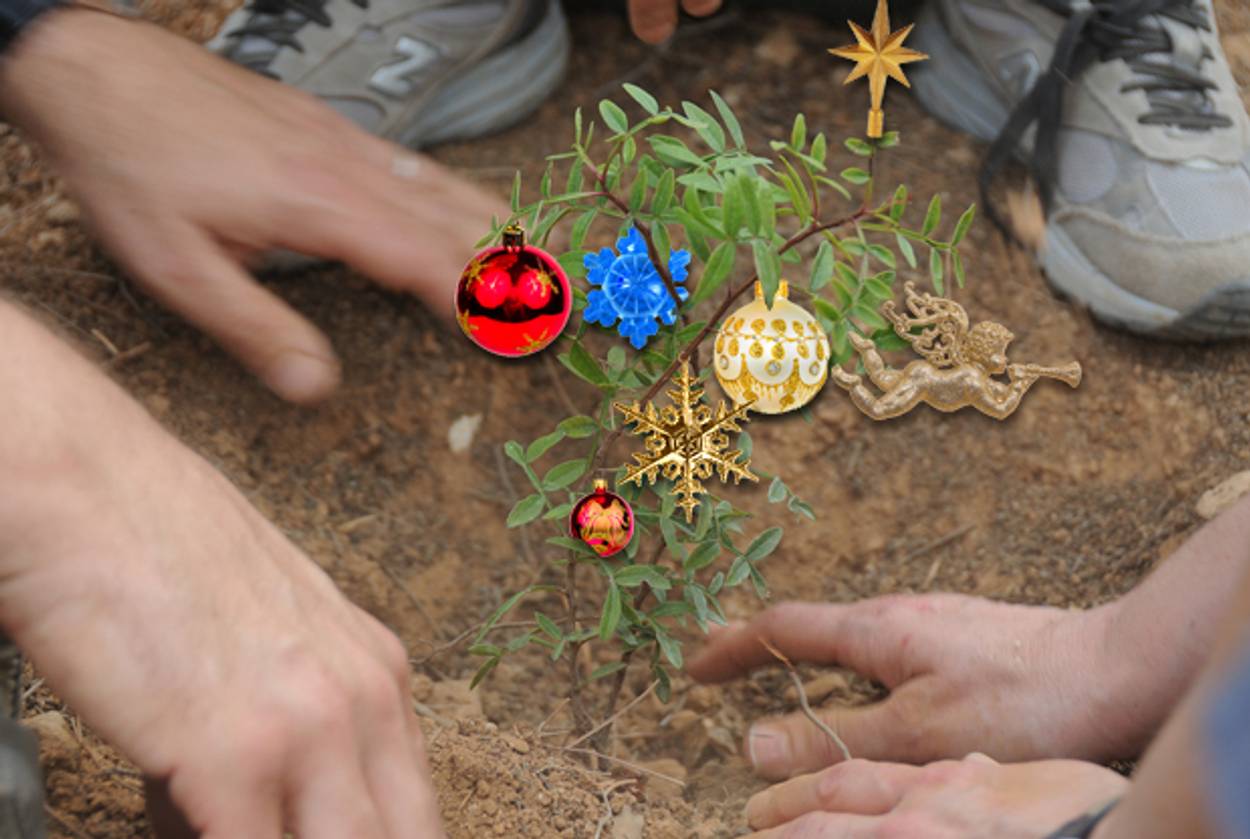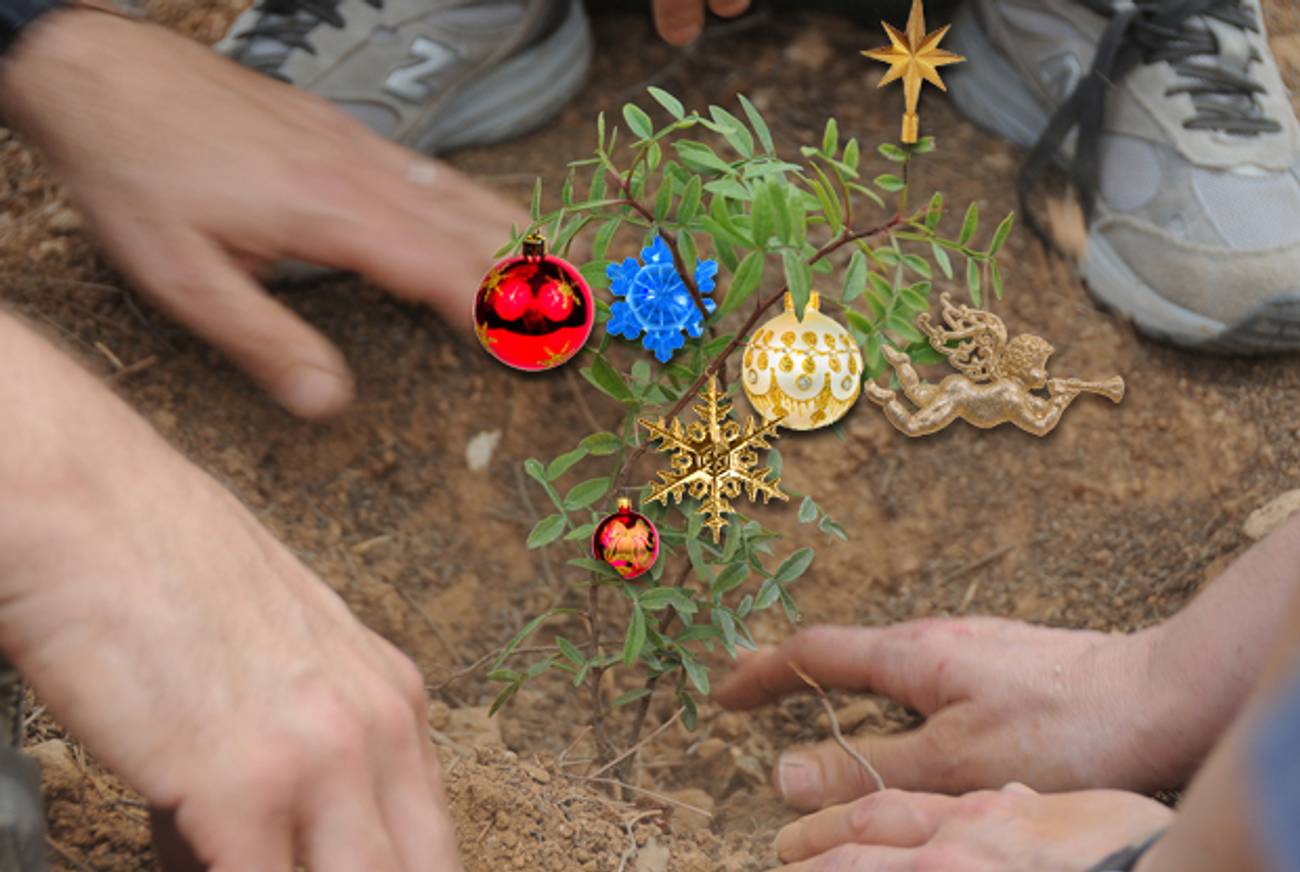Is That My Christmas Tree?
The Jewish National Fund is giving away pines for Christmas—and irony isn’t one of the reasons they’re doing it




There is a scene in the famous 1964 Israeli film Sallah Shabati that satirizes a deep truth about American Jews: They can easily be seduced by something the rest of the world might see as a gimmick. In the film, as groups of earnest, well-heeled Americans are shown around a blossoming, soon-to-be JNF forest ostensibly named in honor of their generous donations, a foreman replaces a placard bearing their name as they leave with another bearing the name of a different American family. The film doesn’t demonize the organization that has been reforesting Israel for more than 100 years for duping well-intentioned donors, but instead mocks the almost uniquely American hope that by donating to the JNF they’re doing the next closest thing to digging into the earth and planting a tree themselves.
Indeed, the highlight of my birthright trip was leaving the spot where my group planted a tree. As we walked away, I turned around to get one more look at it and, like Orpheus seeing Eurydice, saw my little sapling ripped from the earth as another Birthright group arrived.
All of this—and more—came to mind when I read a small news bulletin earlier in the week: This holiday season, the JNF is donating pines to journalists, churches, and diplomats for Christmas trees. By now we may have accepted that the small sum of $18 doesn’t buy us anything more than the illusion of tree ownership in a faraway land: It’s one thing not to plant our trees to begin with, but it’s something entirely different to give them to European diplomats who will undoubtedly decorate them in bobbins of colorful lights as they drink decidedly un-kosher mulled wine and sing multilingual versions of “O Tannenbaum.” This wouldn’t go over too well with my 88-year-old grandmother, who turns any minor family event into a reason to have another tree planted in Israel.
Russell Robinson, CEO of the Jewish National Fund, explained the myths and facts of the JNF’s memorial-tree business when I spoke to him on the phone. “Does it have Uncle Morris’ name? No,” explained Robinson. “Uncle Morris’ name is part of that participation of the greening of Israel,” said Robinson. In other words, the JNF accepts a donation and uses it to fund the planting of trees (among other things), but definitely not to plant a tree with anyone’s name on it. He confirmed that the organization has been giving away the felled branches of large pine trees for Christmas for many years. Surprisingly, irony isn’t one of their reasons they do it. Above all else, Robinson told me, “it’s a gesture”—a way to welcome and accommodate those who do not celebrate Hanukkah but who still live in the Jewish state.
The pine trees also need to be trimmed each year, and usually this maintenance is conveniently needed around Christmas time. Most of what the JNF donates are these trimmed branches. However, Robinson also told me that after 20 or so years the sap on pine trees becomes highly flammable, and whole trees also need to be cut down after a certain amount of time. These trees are for sale, and proper Christmas trees are all the rage in Israel, especially at the U.S. Embassy, which is one of the top recipients of these trees. The JNF’s donations also deter rogue lumberjacks from cutting down trees on their own, and in the process possibly injuring or killing themselves. Getting crushed by a tree isn’t exactly a Christmas miracle.
As it turns out, pine trees have had an interesting history in the Jewish state, one that stretches back long before they were sold on JNF lots as Christmas trees. When Israel was still a territory of the Ottoman Empire, there was a regulation that gave landowners a window of seven years to plant trees on their property. In order to ensure that trees were planted and grown, Ashkenazi Jews brought pine trees from the Black Forest in Russia, which take very few years to grow and can survive almost anywhere. As a result, today there are countless forests of pine trees in Israel. And over the last century, the JNF has raised enough money to plant nearly 300 million trees in Israel and even start a large firefighting brigade.
Despite the obvious benefits of donating trees—reaching out to Christians, good PR, preventing accidental self-harm on the part of amateur lumberjacks—there is something indeed strange about the notion that these trees, which have become staples of Jewish life, lead a second life as Christmas trees. It would be a lot like taking the melted wax from memorial candles in churches and giving them away as Hanukkah candles and then selling the really big ones as Shabbos candles. And yet the JNF sees this contradiction somewhat poetically: “Every tree that is planted will go through its cycle of life,” Robinson said at the end of our conversation.
Which of course is another way of saying that once Uncle Morris’ tree starts producing sap, it will only be so long before it is sold off as a Christmas tree.
***
Like this article? Sign up for our Daily Digest to get Tablet Magazine’s new content in your inbox each morning.
Alexander Aciman is a writer living in New York. His work has appeared in, among other publications, The New York Times, Vox, The Wall Street Journal, and The New Republic.
Alexander Aciman is a writer living in New York. His work has appeared in, among other publications, The New York Times, Vox, The Wall Street Journal, and The New Republic.